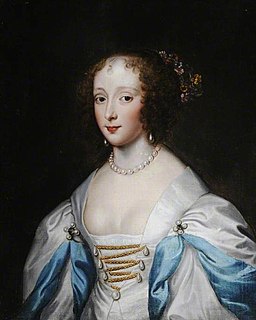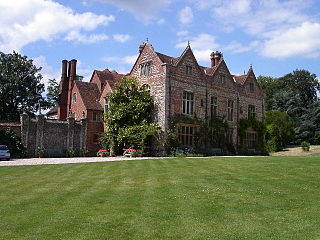Sir Henry Anderson (born c.1582) was an English politician who sat in the House of Commons at various times between 1614 and 1643. He supported the Royalist cause in the English Civil War.

The House of Commons of England was the lower house of the Parliament of England from its development in the 14th century to the union of England and Scotland in 1707, when it was replaced by the House of Commons of Great Britain. In 1801, with the union of Great Britain and Ireland, that house was in turn replaced by the House of Commons of the United Kingdom.

The English Civil War (1642–1651) was a series of armed conflicts and political machinations between Parliamentarians ("Roundheads") and Royalists ("Cavaliers") over, principally, the manner of England's governance. The first (1642–1646) and second (1648–1649) wars pitted the supporters of King Charles I against the supporters of the Long Parliament, while the third (1649–1651) saw fighting between supporters of King Charles II and supporters of the Rump Parliament. The war ended with the Parliamentarian victory at the Battle of Worcester on 3 September 1651.
Anderson was the son of Henry Anderson of Newcastle, Northumberland. He matriculated at Christ Church, Oxford on 24 November 1599, aged 17, when he was of Long Cowton, Yorkshire. [1] He was of London when he was knighted at the house of Sir Thomas Hasilrig at Holmby Alderton (4 August 1608). [2] He was Mayor of Newcastle (1613–14). [3]

Christ Church is a constituent college of the University of Oxford in England. Christ Church is a joint foundation of the college and the cathedral of the Oxford diocese, which serves as the college chapel and whose dean is ex officio the college head.
In 1614, Anderson was elected Member of Parliament for Newcastle upon Tyne. He was High Sheriff of Northumberland (1615–16). [3] He was re-elected MP for Newcastle (1621, 1624, 1625 and 1626). [4]
This is a list of the High Sheriffs of the English county of Northumberland. The High Sheriff is the oldest secular office under the Crown. Formerly the High Sheriff was the principal law enforcement officer in the county but over the centuries most of the responsibilities associated with the post have been transferred elsewhere or are now defunct, so that its functions are now largely ceremonial. The High Sheriff changes every March.
In November 1640, Anderson was elected MP for Newcastle upon Tyne in the Long Parliament [4] and sat until he was disabled on 4 September 1643 for supporting the King.

The Long Parliament was an English Parliament which lasted from 1640 until 1660. It followed the fiasco of the Short Parliament which had convened for only three weeks during the spring of 1640, and which in turn had followed an 11-year parliamentary absence. In September 1640, King Charles I issued writs summoning a parliament to convene on 3 November 1640. He intended it to pass financial bills, a step made necessary by the costs of the Bishops' Wars in Scotland. The Long Parliament received its name from the fact that, by Act of Parliament, it stipulated it could be dissolved only with agreement of the members; and, those members did not agree to its dissolution until 16 March 1660, after the English Civil War and near the close of the Interregnum.
Anderson married Mary Remington. [3]


